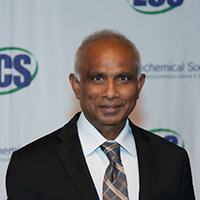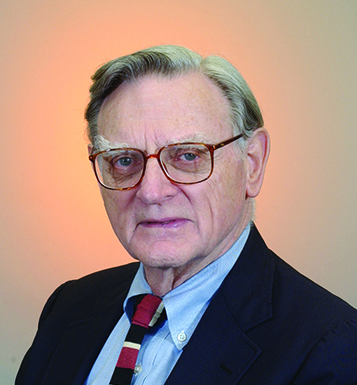The Electrochemistry Society (ECS) is pleased to announce that Professor Arumugam Manthiram, George T. & Gladys H. Abell Endowed Chair of Engineering at the University of Texas at Austin, has been named the first recipient of the newly created John B. Goodenough Award of The Electrochemical Society. The Goodenough award recognizes distinguished contributions to the fundamental and technological aspects of electrochemical materials science and engineering. Professor Manthiram’s major contributions to the field include pioneering fundamental and technological contributions to electrochemical energy conversion and storage, involving the development of new materials, advanced characterization, structure-property-performance relationships, and prototype devices. Key examples include the development of sustainable, low-cost, durable materials for batteries and fuel cells, as well as delineation of the intricacies involved with ion and electron transport and magnetic interactions in transition-metal oxides. The award will be presented during the 243rd ECS Meeting in Boston, MA, from May 28 to June 2, 2023. Prof. Manthiram will deliver his award address at that meeting.
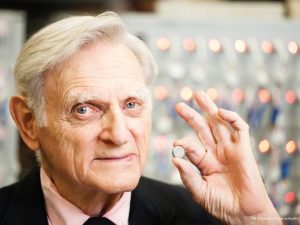 The Electrochemical Society is now accepting nominations for the newly established John B. Goodenough Award of The Electrochemical Society
The Electrochemical Society is now accepting nominations for the newly established John B. Goodenough Award of The Electrochemical Society
The Society announced the creation of the new biannual award at Nobel laureate and longtime ECS member John B. Goodenough’s 100th Birthday Celebration on July 25, 2022. The award recognizes distinguished and outstanding contributions in:
- Fundamental and technological aspects of electrochemical materials science and engineering;
- Materials innovations in the areas of batteries, solid ion conductors, fuel cells, transition-metal oxides, and/or magnetic materials.
Nomination deadline: October 23, 2022
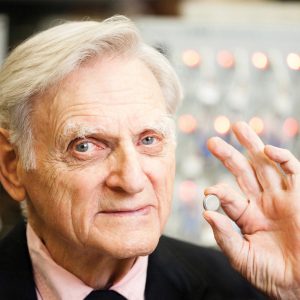 The Electrochemistry Society announced the creation of a new biannual award at Nobel laureate John B. Goodenough’s 100th Birthday Celebration on July 25, 2022. “When we announced the new award at his 100th Birthday Celebration, Prof. Goodenough turned to the audience and said, ‘Thank you. Thank you all very much, and remember this: one step at a time!’ John’s unprecedented years of service to the scientific community are an inspiration to us all,” said Christopher Jannuzzi, ECS Executive Director and Chief Executive Officer.
The Electrochemistry Society announced the creation of a new biannual award at Nobel laureate John B. Goodenough’s 100th Birthday Celebration on July 25, 2022. “When we announced the new award at his 100th Birthday Celebration, Prof. Goodenough turned to the audience and said, ‘Thank you. Thank you all very much, and remember this: one step at a time!’ John’s unprecedented years of service to the scientific community are an inspiration to us all,” said Christopher Jannuzzi, ECS Executive Director and Chief Executive Officer.
The John B. Goodenough Award of The Electrochemical Society
The new award recognizes distinguished contributions to the fundamental and technological aspects of electrochemical materials science and engineering. The recipient will be renowned for paradigm-shifting contributions in the fields of electrochemical and/or solid state science and exceptionally creative experimental or theoretical studies that opened new directions in electrochemical energy storage, electrocatalysis, and/or solid ion conductors and high temperature materials for electrochemical devices. The first recipient will receive the award and present a general address at the 243rd ECS Meeting in Boston, MA, in May 2023.
JES and JSS Joint Focus Issue: In Honor of John B. Goodenough – A Centenarian Milestone
Posted on October 21, 2021 by Adrian PlummerDuring his ECS Masters Interview at the 2016 ECS PRiME Meeting, John Goodenough vulnerably disclosed that as a child, he had dyslexia and could not read like others his age. He described leaving home at the age of 12 for an affluent boarding school as a struggling scholarship student. Stories were shared about life events that led John on the path of science and discovery, as well as the individuals who supported and guided him along the way. And when asked about the dissemination of scientific content, John imparted his belief that scholarly societies are essentially in the business of fostering partnerships to serve the community at large. He emphasized the role of societies in creating space to convene the community to further scientific advancement.
The editorial teams of the ECS Journal of Solid State Science and Technology and Journal of The Electrochemical Society have come together in the spirit of this belief. They are publishing a focus issue comprised of 80+ select invited papers celebrating and honoring the life, legacy, and contributions of beloved professor and longtime ECS member Dr. John B. Goodenough.
The full issue is scheduled to be available in May 2022—just two months before John’s 100th birthday.
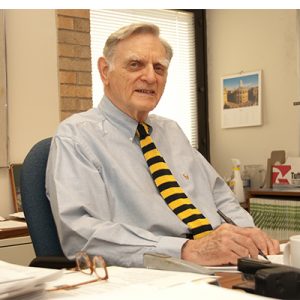 “Good enough” are just words in his last name, but not ones John B. Goodenough seems to live by. The 97-year-old, widely referred to as the “father of the lithium-ion batteries,” continues to awe the battery field. According to IEEE Spectrum, the 2019 Nobel Prize winner recently co-developed a rapid-charging, non-flammable, glass battery.
“Good enough” are just words in his last name, but not ones John B. Goodenough seems to live by. The 97-year-old, widely referred to as the “father of the lithium-ion batteries,” continues to awe the battery field. According to IEEE Spectrum, the 2019 Nobel Prize winner recently co-developed a rapid-charging, non-flammable, glass battery.
The high capacity battery charges in “minutes rather than hours,” according to Maria Helena Braga, professor of engineering at the University of Porto in Portugal, who worked with Goodenough to develop the solid state lithium rechargeable which uses a glass doped with alkali metals as the battery’s electrolyte. In addition, the solid state electrolyte is not flammable and preforms in both cold and hot weather. (more…)
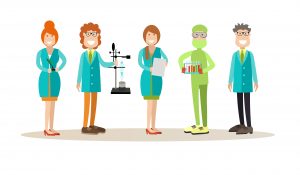 The Electrochemical Society is proud to announce the Society’s most distinguished members recognized as 2019 Highly Cited Researchers. The prestigious list, published by the Web of Science Group at Clarivate Analytics, identifies scientists and social scientists who produced multiple papers ranking in the top 1% by citations for their field and year of publication, demonstrating significant research influence among their peers. (more…)
The Electrochemical Society is proud to announce the Society’s most distinguished members recognized as 2019 Highly Cited Researchers. The prestigious list, published by the Web of Science Group at Clarivate Analytics, identifies scientists and social scientists who produced multiple papers ranking in the top 1% by citations for their field and year of publication, demonstrating significant research influence among their peers. (more…)
John Goodenough: Royal Society’s Newest Copley Medal Recipient
Posted on July 24, 2019 by Jennifer Quartararo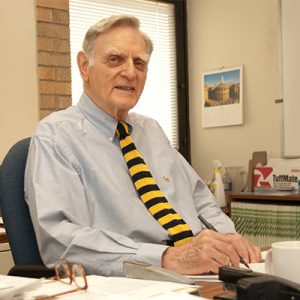 John Bannister Goodenough, internationally recognized as one of the key minds behind the development of the first commercial lithium-ion battery, has been awarded the Royal Society’s Copley Medal, the world’s oldest scientific prize.
John Bannister Goodenough, internationally recognized as one of the key minds behind the development of the first commercial lithium-ion battery, has been awarded the Royal Society’s Copley Medal, the world’s oldest scientific prize.
The longtime ECS fellow and honorary member was recognized for his exceptional contributions to the materials science field, still used in mobile electronics today, including laptops and smartphones all around the world. The award ties him to an elite group of equally notable scientists and engineers, including the likes of Benjamin Franklin, Charles Darwin, Louis Pasteur, Albert Einstein, and Dorothy Hodgkin.
“Words are not sufficient to express my appreciation for this award,” said Goodenough, in a Royal Society interview. “My ten years at Oxford were transformative for me, and I thank especially those who had the imagination to invite a U.S. non-academic physicist to come to England to be a Professor and Head of the Oxford Inorganic Chemistry Laboratory. I regret that age and a bad leg prevent my travel back to England to celebrate such a wonderful surprise.”
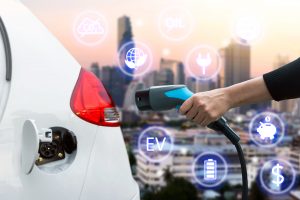 In 1888, German inventor Andreas Flocken created what is widely considered the world’s first electric car. According to The Battery Issue, recently published by The Verge, the 900-pound vehicle drove at the top speed of nine miles per hour, coming to a halt after a two and a half hour test ride. Although it was considered a success, it wasn’t entirely. The car’s battery, sustainably charged with water power, had died.
In 1888, German inventor Andreas Flocken created what is widely considered the world’s first electric car. According to The Battery Issue, recently published by The Verge, the 900-pound vehicle drove at the top speed of nine miles per hour, coming to a halt after a two and a half hour test ride. Although it was considered a success, it wasn’t entirely. The car’s battery, sustainably charged with water power, had died.
Today, nearly 130 years, German carmakers are still having trouble with their batteries – specifically with battery cells. As a result, car companies are relying on suppliers from China, Korea, and Japan for the highly needed component.
“Cells can be a major technology differentiator and cells are the by far most costly part of the battery pack,” says Martin Winter, a professor of materials science, energy, and electrochemistry at the University of Münster and ECS Battery Division and Europe Section member. Winter says a large scale production of battery cells by European or German companies will be crucial in order to take part in the “enormous and rapidly growing market.”


